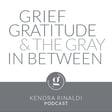
Hospice Nurse Julie: Navigating Death, Grief, and Life's Transitions with Julie McFadden
JULIE MCFADDEN, RN, is the New York Times bestselling author of Nothing to Fear and a hospice/palliative care nurse with more than fifteen years of experience. Passionate about normalizing death and dying, she has more than one million followers on TikTok as @hospicenursejulie. She has been featured in Newsweek, Time, USA Today, and The Atlantic, and has appeared on Dr. Phil Primetime, Howie Mandel Does Stuff, and elsewhere. Her most recent book THE NOTHING TO FEAR JOURNAL is an invaluable tool for putting our beliefs about death into practice through thought-provoking questions that prompt reflection, clarification, and planning.
Interview Highlights:
• Introducing Hospice Nurse Julie: Meet Julie McFadden, an RN known as "Hospice Nurse Julie" on TikTok (1.6M+ followers) and a New York Times bestselling author of "Nothing to Fear" and "Nothing to Fear Journal"
• Breakups as Grief: She shares how a painful breakup at 28-29 was a "greatest gift," fostering self-discovery and growth, and how breakups represent profound, often unvalidated grief and transitions.
• Fear of Transition: Kendra and Julie explore how fear of the unknown, not death itself, makes life transitions scary, and criticize society's "fix-it" culture that avoids uncomfortable emotions.
• Finding Hospice: Unhappy in the ICU, Julie "took the plunge" into hospice nursing, even without prior experience, finding her calling and realizing the environment, not nursing itself, was the issue.
• Personal Beliefs on Death: Julie, having experienced tragic deaths young, believes we go to a place that feels "more like home" after death, a belief validated by her hospice work, though she emphasizes it's a personal journey. Faith can aid in peaceful dying, but is not a prerequisite; she's seen atheists die peacefully and religious people struggle.
• TikTok Phenomenon: Inspired by her nieces during COVID-19, Julie started TikTok, initially thinking it "stupid". Her fourth video went viral, leading to rapid organic growth across platforms (1.6M+ on TikTok, 1.3M on Facebook, nearly 500K on Instagram, nearly 600K on YouTube) and a book deal, indicating people were "more ready to talk about this than we knew.
• "Nothing to Fear" Book & Journal: Her New York Times bestselling book is an educational resource with intertwined stories and an index. The "Nothing to Fear Journal" offers step-by-step guidance for preparing for death, exploring existential questions, and uncovering personal belief.
• Comfort in Biology: The most comforting aspect of death for Julie is the biology of the body, how it naturally prepares by shutting off hunger/thirst and increasing calcium, which she sees as a miracle and the primary reason she is not afraid of death.
Contact Kendra Rinaldi for a Free Discovery call email her at griefgratitudepodcast@gmail.com to set up an appointment.
Subscribe on the website be on the podcast newsletter
To be a guest visit https://www.griefgratitudeandthegrayinbetween.com/book-online


